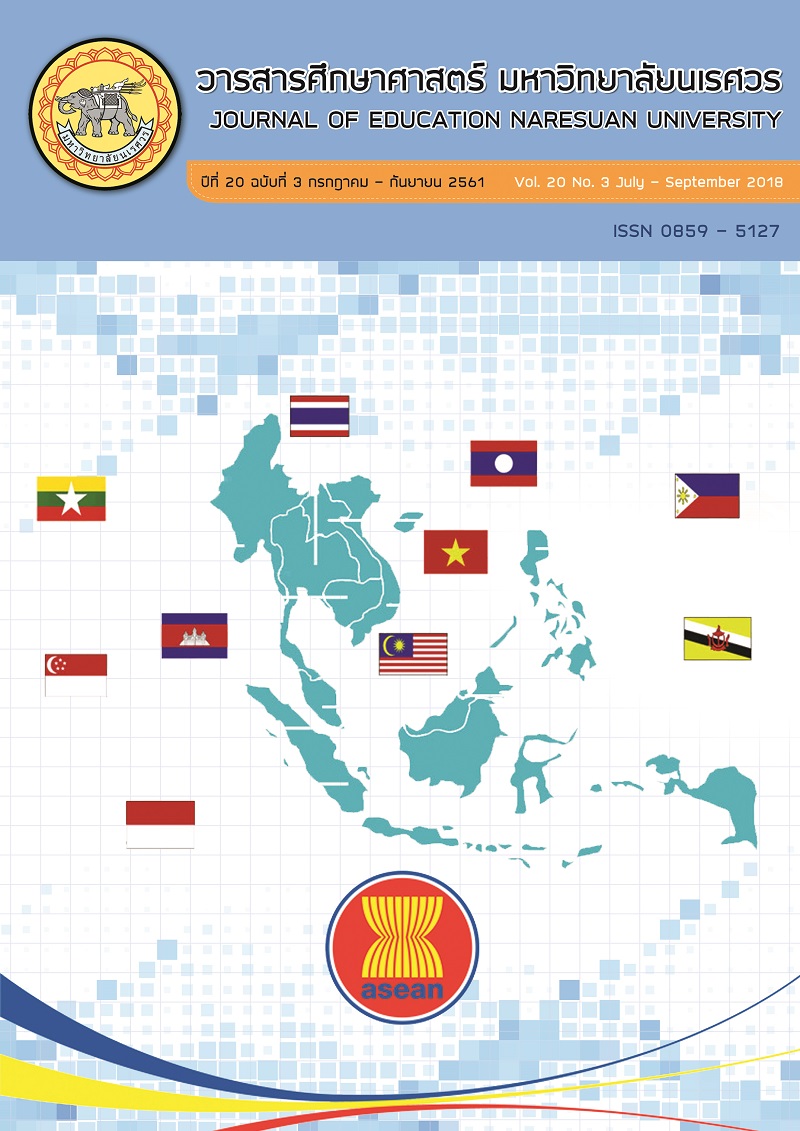การวิเคราะห์กลุ่มแฝงความต้องการจำเป็นด้านการประเมินการเรียนรู้ของครู; A LATENT CLASS ANALYSIS OF TEACHERS’ NEEDS ASSESSMENT ON LEARNING ASSESSMENT
Main Article Content
Abstract
การวิจัยครั้งนี้มีวัตถุประสงค์เพื่อประเมินความต้องการจำเป็นด้านการประเมินการเรียนรู้ของครู และจัดกลุ่มครูตามความต้องการจำเป็นด้านการประเมินการเรียนรู้ กลุ่มตัวอย่างเป็นครูสังกัดสำนักงานเขตพื้นที่การศึกษามัธยมศึกษา ภาคเหนือตอนบน 712 คน ได้มาโดยการสุ่มแบบหลายขั้นตอน เครื่องมือที่ใช้ในการวิจัย คือ แบบประเมินความต้องการจำเป็นด้านการประเมินการเรียนรู้ของครู เป็นลักษณะแบบตอบสนองคู่ มีค่าดัชนีความสอดคล้องระหว่างพฤติกรรมบ่งชี้กับนิยาม (IOC) ตั้งแต่ 0.80 ถึง 1.00 มีค่าอำนาจจำแนก (rxy) ระหว่าง 0.493 ถึง 0.766 และค่าความเชื่อมั่น () เท่ากับ 0.984 วิเคราะห์ข้อมูลโดยใช้การคำนวณค่าดัชนี PNImodified และการวิเคราะห์กลุ่มแฝง ผลการวิจัย พบว่า
1. ครูมีความต้องการจำเป็นด้านการประเมินการเรียนรู้มากที่สุด 3 อันดับแรก ได้แก่ ด้านทักษะการสร้างและหาคุณภาพเครื่องมือ ด้านความรู้ในการสร้างและหาคุณภาพเครื่องมือ และด้านทักษะการนำผลการประเมินไปใช้ ตามลำดับ
2. ผลการจัดกลุ่มครูตามความต้องการจำเป็นด้านการประเมินการเรียนรู้ สามารถแบ่งได้ 4 กลุ่ม ได้แก่ กลุ่มที่ 1 ครูผู้ใฝ่เรียนรู้เกี่ยวกับการประเมินการเรียนรู้ คิดเป็น 16.60% กลุ่มที่ 2 ครูผู้พัฒนาตนเองรอบด้านในการประเมินการเรียนรู้ คิดเป็น 21.10% กลุ่มที่ 3 ครูผู้มีความพร้อมในด้านการประเมินการเรียนรู้ คิดเป็น 36.10% กลุ่มที่ 4 ครูผู้พัฒนาสมรรถนะตนเองด้านการประเมินการเรียนรู้ คิดเป็น 26.20% (Likelihood = -3088.340, df = 35, AIC= 6246.680, BIC = 6406.562, ABIC = 6295.429 และ Ek = 0.818)
A LATENT CLASS ANALYSIS OF TEACHERS’ NEEDS ASSESSMENT ON LEARNING ASSESSMENT
The objectives of this study were to assess teachers’ needs assessment on learning assessment and arrange groups of teachers a long with need assessment of learning assessment. The sample group consisted of 712 teachers under the office of Secondary Educational Service Area in the upper north region obtained from Multi-Stage Random sampling technique. The instrument used in this study included a questionnaire about teachers’ needs assessment on learning assessment in a dual-response format with the content validity by Item - Objective Congruence (IOC) score 0.80-1.00, the discrimination levels by Item Total Correlation (rxy) of 0.493 – 0.766 and reliability coefficients by Cronbach's Alpha () at 0.984. The data were analyzed by the modified proportionate natural influence index (PNImodified), and latent class analysis (LCA). The study findings summarized as follows:
1. The top three needs of teachers in learning assessment were the skills for constructing and verifying quality of assessment instruments, the knowledge for constructing and verifying the instruments quality and the skills of implementing assessment results, respectively.
2. The results of arrangement groups of teachers a long with needs assessment of learning assessment can be divided into 4 groups. 1) Teachers who have self-directed on learning assessment (16.60%). 2) Teachers who have self-development on learning assessment (36.10%). 3) Teachers who have readiness on learning assessment (36.10%) and 4) Teachers who have competency development on learning assessment (26.20%). (Likelihood = -3088.340, df = 35, AIC = 6246.680, BIC = 6406.562, ABIC = 6295.429 and Ek = 0.818).
Article Details
The owner of the article does not copy or violate any of its copyright. If any copyright infringement occurs or prosecution, in any case, the Editorial Board is not involved in all the rights to the owner of the article to be performed.
References
Busyanond, K. (2003). State and problems of instructional organization in social studies, religion and culture strand in the pilot schools under the Department of General Education, Bangkok Metropolis Master thesis). Bangkok: Chulalongkorn University. (in Thai)
Chatikul, N. (2009). A needs assessment for the development of learning assessment competency of secondary school social studies teachers in Bangkok (Master thesis). Bangkok: Chulalongkorn University. (in Thai)
Chongrak, T. (2000). Measurement and evaluation process in primary school: A case study of schools under the educational reform project, the Office of Provincial, Primary Education, Nongkhai Province (Master thesis). Khon Kaen: Khon Kaen University. (in Thai)
Chukampaeng, C. (2010). Learning assessment. Maha Sarakham: Mahasarakham University. (in Thai)
Hair, J., Anderson, R., Tatham, R., & Black, W. (1998). Multivariate data analysis (5th ed.). Upper Saddle River, NJ: Prentice Hall.
Harlen, W. (1994). Towards quality in assessment. London: Paul Chapman.
Jamdaung, P. (2008). State and problems of social studies instruction in English programs, Bangkok metropolis (Master thesis). Bangkok: Chulalongkorn University. (in Thai)
Jogsatit, W. (2002). Authentic assessment of Prathomsuksa 5 students: A local curriculum focused on a systemic approach to integrated agriculture (Master thesis). Bangkok: Kasetsart University. (in Thai)
Kanjanawasee, S. (2013). Classical test theory (7th ed.). Bangkok: Chulalongkorn University Press. (in Thai)
Kaufman, R. (2000). Mega planning. Thousand oaks: Sage Publications.
Khammani, T. (1999). CIPPA Model. Academic Journal, 2(5), 3-30. (in Thai)
Madaus, G. (1992). An independent auditing mechanism for testing. Educational Measurement: Issues and Practice, 11(1), 26-31.
Office of the Education Council. (2003). National education act B.E. 2542 (1999) and amendments (second national education act B.E. 2545 (2002). Bangkok: Pimdeekarnpim. (in Thai)
Palaporn, W. (2014). The model for development competency of measurement of measurement and evaluation thinking for the primary-school teacher under the jurisdiction of office of basic education commission. SWU eJournals, 15(2), 74-84. (in Thai)
Pathiyathanee, S. (2008). Educational measurement (6th ed.). Kalasin: Prasan Printing. (in Thai)
Phuvipadawat, S. (2001). Student- centered teaching and authentic assessment (2nd ed.). Chiang Mai: The Knowledge Center. (in Thai)
Pinyoanantapong, B. (2001). Learner-centered assessment: Concepts and methods. Bangkok: Amarion Printing. (in Thai)
Plubjeen, K., & Kaemkate, W. (2014). A latent class analysis of teachers’ professional identity. OJED, 9(2), 597-611. (in Thai)
Popham, W. (2005). Assessments for educational leaders. New York: Allyn Bacon.
Wiratchai, N. (1999). LISREL model: Statistical analysis for research. Bangkok: Chulalongkorn University. (in Thai)
Witkin, B., & Altschuld, J. (1995). Planning and conducting needs assessments. Thound Oaks: Sage Publications.
Wongwanich, S. (2015). Needs assessment research (3rd ed.). Bangkok: Chulalongkorn University Press. (in Thai)


